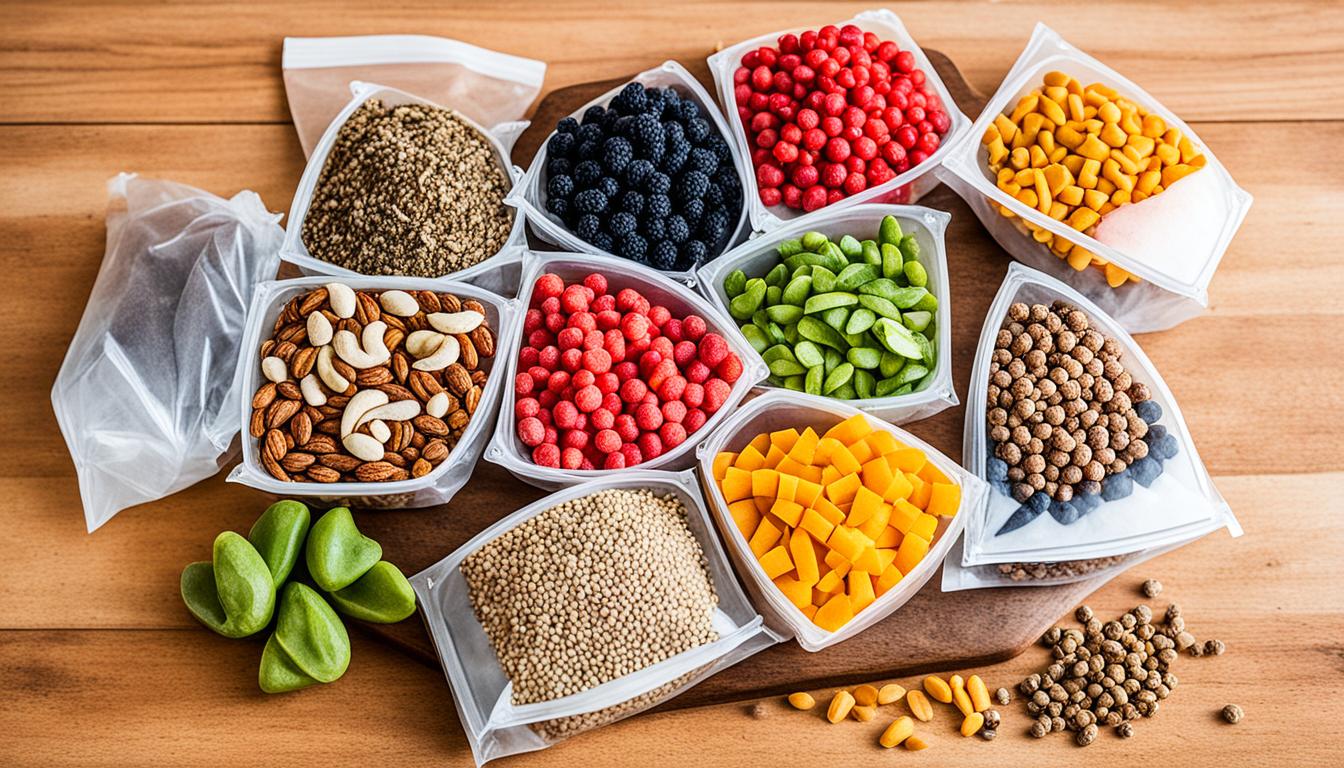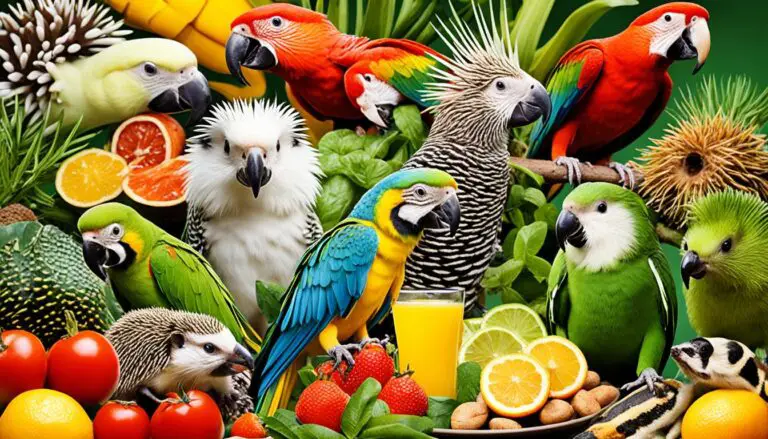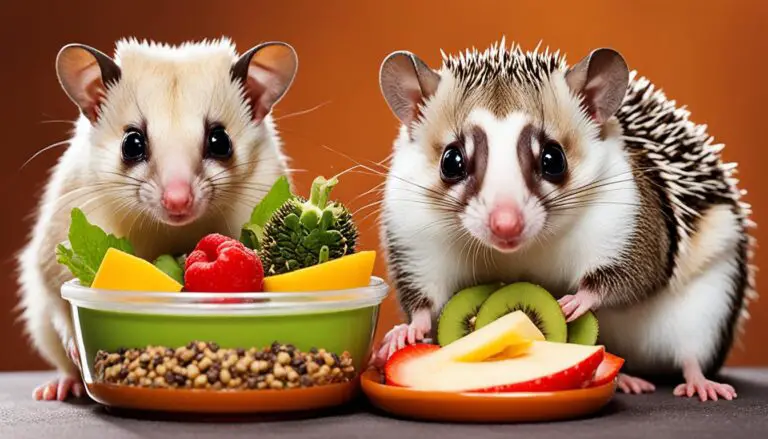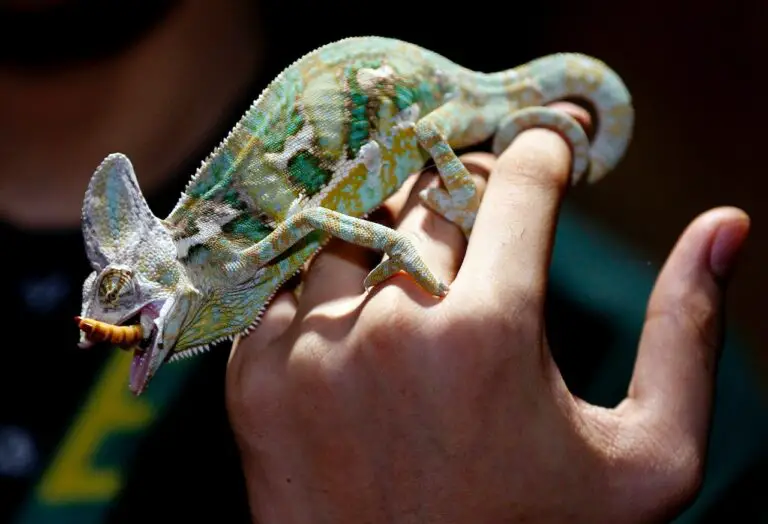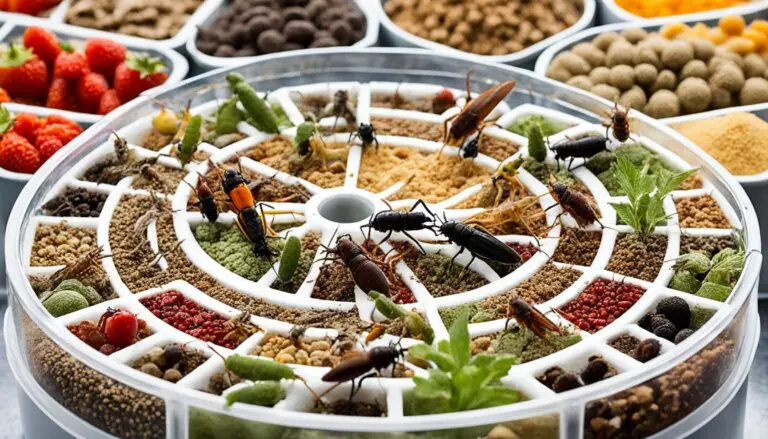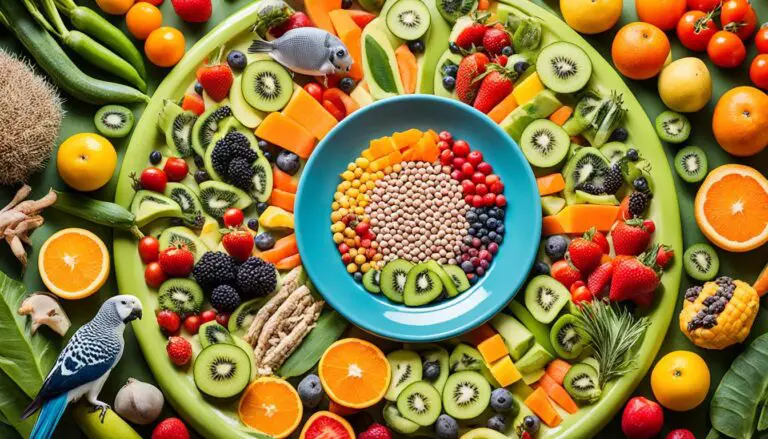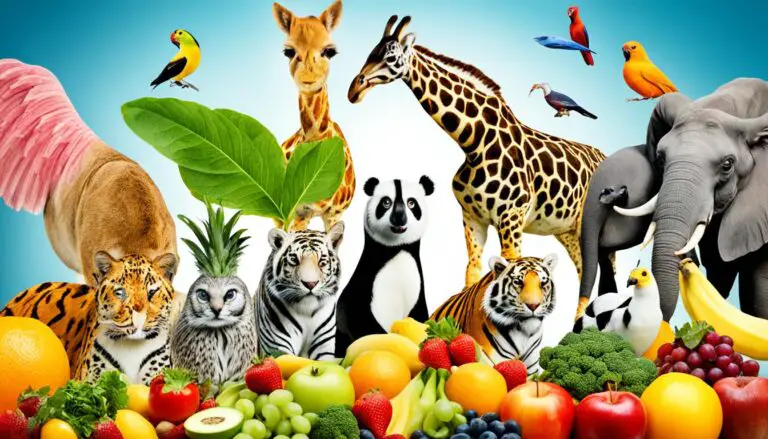Exotic Pet Diets: Pellets, Fresh Foods & Homemade
Exotic pets require a unique diet for their well-being. It’s more than just any pet food from the store. They need specific nutrients to stay healthy. This means feeding them a mix of pellets, fresh foods, and homemade meals. Such a variety ensures they get all the nutrition they need.
Choosing an exotic pet’s diet involves several options. Each choice has its own pros and cons. We’ll look at diets like the Exotic Nutrition Fresh diet and Bourbon’s Modified Leadbeater diet. These are good for exotic pets. We’ll also see what’s right for rabbits and sugar gliders, like fresh food and extra vitamins.
Ready to find the perfect diet for your exotic pet? Let’s explore how to keep them in top health and high spirits!
Key Takeaways:
- Exotic pets require a specialized diet for optimal health and well-being.
- Pellets, fresh foods, and homemade diets are essential components of an exotic pet’s diet.
- The Exotic Nutrition Fresh diet and Bourbon’s Modified Leadbeater diet are recommended options for exotic pets.
- Fresh foods and nutritional variety are important for rabbits’ diets.
- Sugar gliders need a fresh foods diet that includes fruit, vegetables, and protein.
The Exotic Nutrition Fresh Diet for Exotic Pets
The Exotic Nutrition Fresh diet is great for exotic pets. It has the right mix of nutrients for your pets’ health and happiness.
What is the Exotic Nutrition Fresh diet?
This diet includes fresh veggies, fruits, protein, bee pollen, and more. It’s all about giving your pets a healthy mix of foods.
Key Components of the Exotic Nutrition Fresh diet:
- 10 oz of fresh vegetables with a balanced calcium to phosphorus (Ca:P) ratio
- 5 oz of fresh fruit with a balanced Ca:P ratio
- 5 oz of protein
- 1 tsp of bee pollen
- 1 tsp of acacia gum
- 1 tsp of calcium powder
- 1/4 cup of water
This diet is carefully balanced to support strong bones and overall health. Veggies and fruits provide vital vitamins and minerals. Proteins help with muscle strength.
Bee pollen and acacia gum are natural boosts. Calcium powder ensures your pet has healthy teeth and bones.
| Component | Amount |
|---|---|
| Fresh vegetables (balanced Ca:P ratio) | 10 oz |
| Fresh fruit (balanced Ca:P ratio) | 5 oz |
| Protein | 5 oz |
| Bee pollen | 1 tsp |
| Acacia gum | 1 tsp |
| Calcium powder | 1 tsp |
| Water | 1/4 cup |
This diet is key for exotic pets’ health and a long life. Always check with a vet about how much to feed your pets. They can also guide you on any special diet needs.
Adding the Exotic Nutrition Fresh diet can make a big difference in your pet’s health. It’s a smart choice for a happy and long life with your pet.
The Bourbon’s Modified Leadbeater Diet for Exotic Pets
The Bourbon’s Modified Leadbeater diet is a top pick for exotic pets. It offers a range of healthy ingredients. These keep pets in great shape and full of life.
It is made up of important foods that give pets all the nutrients they need. Main items in this diet are:
- 1/4 cup of apple juice
- 1/2 cup of honey
- 1 egg
- 4 oz of Gerber Yogurt and Juice Blend (or substitute)
- 1 tsp of Rep-Cal Herpivite
- 2 tsp of Rep-Cal Calcium
- 5 oz of chicken baby food
- 1/4 cup of wheat germ
- 1/2 cup of dry baby cereal
Every part of the Bourbon’s Modified Leadbeater diet is key for exotic pets’ nutrition. Apple juice and honey add sweetness and texture. They make the diet enjoyable for pets.
A protein source, like Gerber Yogurt and Juice Blend, is also essential. It helps with muscle growth and upkeep. Adding an egg boosts the diet’s protein even more.
For vitamins and minerals, Rep-Cal Herpivite and Rep-Cal Calcium supplements are used. They are crucial for pets’ health and functions. These also help in keeping bones strong.
Chicken baby food is a great protein source. Wheat germ and dry baby cereal add extra nutrients and fiber. Together, they create a well-balanced meal for exotic pets.
Keep in mind, although the Bourbon’s Modified Leadbeater diet is rich in nutrients, it’s best to talk to a vet. They can make sure the diet fits your pet’s unique needs.
By using the Bourbon’s Modified Leadbeater diet, pet owners can ensure their pets get the best nutrition. This leads to better health and happiness for exotic pets.

References:
- Example Reference – Placeholder
- Example Reference – Placeholder
- Example Reference – Placeholder
Fresh Foods Diet for Rabbits
Rabbits love to eat fresh and healthy foods. A mix of fruits and veggies gives them the nutrients they need. It’s key to offer a wide variety of fresh foods. This ensures they get all the essential nutrients.
Fruits like strawberries and apples make a tasty addition to their diet. They are full of important vitamins and minerals. Vegetables like broccoli, bell pepper, and baby carrots add crunch and flavor. This variety keeps rabbits interested in eating.
Other foods like cucumber, parsnip, and kohlrabi are also great for them. These choices make their meals more diverse and nutritious.
Each rabbit has its own food likes. Knowing what these are can help you customize their diet. This way, they get all the nutrients they need to stay healthy and active.
The Benefits of a Fresh Foods Diet for Rabbits
A fresh diet brings many benefits. Rabbits get essential vitamins, minerals, and fiber for good digestion. The water in these foods also keeps them hydrated.
Feeding rabbits fresh foods supports their health. It also makes mealtime interesting. Remember to introduce new foods slowly to prevent upset stomachs. It’s wise to check with a vet for the best diet advice for your rabbit.
Homemade Diet Considerations for Rabbits
Making your rabbit’s food at home gives you better control over what they eat. It lets you ensure they get nutritious and high-quality meals. But, there are important things to keep in mind when you cook for your bunny.
Nutritional Variety
Rabbits, like people, need a mix of different foods to stay healthy. This mix should include fresh fruits, veggies, and hay. These foods give them important vitamins, minerals, and fiber. Such a varied diet helps them stay in good health, avoiding nutrient shortages.
High Calcium Foods
Calcium is good for rabbits, but too much can cause health issues. Rabbits can get kidney stones if they eat too many high-calcium foods. It’s best to limit these foods in their diets to stay safe.
| High Calcium Foods | Alternative Options |
|---|---|
| Kale | Arugula or Swiss chard |
| Parsley | Cilantro or mint |
| Spinach | Beet greens or dandelion greens |
| Dill | Basil or oregano |
Always speak with a vet or a rabbit nutritionist to ensure your homemade food is balanced.
It’s crucial to think about what your rabbit eats and the calcium in their diet. Do this, and their homemade meals will be great. Also, always keep an eye on their health and body weight. If you’re ever unsure, talking to a pro is a smart move. Homemade meals are a great way to show you care for your fluffy friend.

Fresh Foods Diet for Sugar Gliders
Sugar gliders need a fresh diet with different fruits, veggies, and protein for their vitamins and minerals. This diet is key for sugar gliders to be healthy and happy, giving them what they need to live their best life.
Fresh Fruits
There are many tasty fruits that sugar gliders can enjoy. Some top choices are:
- Apples
- Oranges
- Papayas
- Tangerines
- Pineapples
- Mangos
These fruits are a good source of natural sugar, vitamins, and minerals, which are all vital for your sugar glider’s wellness.
Vegetables
Vegetables are a must in a sugar glider’s diet. Here are a few great veggies for them:
- Sweet potatoes
- Kale
- Collards
- Green beans
These veggies bring lots of essential nutrients to help your sugar glider stay healthy.
Protein
Protein is crucial for sugar gliders’ muscle and body functions. Some good protein choices are:
- Cooked chicken
- Ground turkey
- Eggs
These proteins are full of amino acids that are important for your sugar glider’s health.
Vitamins and Minerals
Besides fruits, veggies, and protein, sugar gliders need vitamins and minerals. These are key for their health and prevent problems from lack of nutrition. A variety of fresh foods helps sugar gliders get all the essential vitamins and minerals they need naturally.
“A balanced fresh foods diet is essential for the overall well-being of sugar gliders, providing them with the nutrition they need to thrive.”
To wrap it up, a fresh diet of fruits, veggies, and protein is vital for sugar gliders. By adding these healthy foods to their diet, owners make sure their sugar gliders get everything necessary for good health.
The Pet Glider Fresh Diet for Sugar Gliders
The Pet Glider Fresh Diet is great for sugar gliders. It gives them all the nutrients they need. This keeps them healthy.
This diet has many good foods for sugar gliders:
• Apple Sauce: It sweetens the diet and adds essential vitamins and minerals.
• Yogurt: It’s rich in protein and calcium, balancing nutrition.
• Orange Juice Concentrate: It’s full of Vitamin C to help the immune system.
• Oatmeal: Aids digestion and is a great energy source.
• Protein: Necessary for growth, it can be from chicken, turkey, or eggs.
• Fresh or Frozen Vegetables: They provide important vitamins and minerals.
• Fresh or Frozen Fruits: They offer vitamins, sugars, and fiber for health.
The Pet Glider Fresh Diet is well-rounded. It meets all the sugar gliders’ nutritional needs. It includes apple sauce, yogurt, and more. All these foods make up a balanced diet for sugar gliders.
Benefits of The Pet Glider Fresh Diet:
- Provides essential vitamins and minerals
- Offers a good source of protein and calcium
- Supports the immune system with antioxidants
- Delivers long-lasting energy
- Includes a variety of fruits and vegetables for a well-rounded diet
Want a great diet for your sugar glider? Try The Pet Glider Fresh Diet. Your pet will be happy and healthy with it.
| Ingredients | Benefits |
|---|---|
| Apple Sauce | Provides essential vitamins and minerals |
| Yogurt | Offers a good source of protein and calcium |
| Orange Juice Concentrate | Supports the immune system with antioxidants |
| Oatmeal | Delivers long-lasting energy |
| Protein (chicken, turkey, or eggs) | Provides essential amino acids for growth and development |
| Fresh or Frozen Vegetables | Supplies a variety of vitamins and minerals for overall health |
| Fresh or Frozen Fruits | Offers natural sugars and additional vitamins |

Importance of Vitamins for Sugar Gliders
Vitamins are vital for the health of sugar gliders, especially calcium. These small marsupials often get too much phosphorus compared to calcium in their food. This can cause troubles like weak bones. So, giving them added vitamins is key, with a focus on calcium.
Sugar gliders need a lot of calcium for strong bones and general health. It also keeps their teeth healthy and their muscles working right. Not getting enough calcium could slow their growth and harm their bones.
But, it’s crucial to not overdo the calcium or phosphorus, since too much phosphorus can block calcium from being used by the body. This upsets the calcium balance, causing health issues. Choosing a supplement with the correct calcium and phosphorus balance is critical for sugar gliders.
The Role of Vitamins in Sugar Glider Nutrition
Vitamins are crucial for sugar gliders, serving many vital roles. Let’s look at some of these functions:
- Vitamin A: It’s key for clear eyesight, a strong immune system, and good reproduction.
- Vitamin B: It supports the body’s use of energy, helps the nerves, and makes new blood cells.
- Vitamin C: Is a powerful antioxidant, strengthens the immune system, and aids in making collagen.
- Vitamin D: Important in absorbing calcium, keeping bones strong, and managing the immune system.
- Vitamin E: It protects against harm from free radicals, promotes skin health, and helps with cell activity.
By adding a balanced vitamin supplement to their food, you can make sure sugar gliders get all the vitamins they need. This supports their health and happiness.
It’s essential to provide vitamins with the correct balance for sugar gliders. A well-balanced diet helps them stay lively over the long haul.
If you need more advice on picking the best vitamin supplement for sugar gliders, a vet who knows about exotic pets can help. They’ll make sure your sugar gliders’ nutritional needs are fully covered.
Additional Treats for Sugar Gliders
Sugar gliders love treats as much as their regular food. These special snacks add nutrition and joy to their lives. When picking treats, remember what they need and what they like. Let’s look at some great treat options for your furry friend:
Yogurt Drops
Yogurt drops are tiny and full of flavor. They’re made from yogurt, so they’re tasty and healthy. These drops have probiotics to keep your sugar glider’s stomach happy and well.
Dried Fruits
Dried fruits like apples, bananas, and papaya are healthy and fun. They’re packed with vitamins but remember, only a little now and then, because they’re sugary.
Freeze Dried Meats
Freeze dried meats, such as chicken or turkey, give a fun crunch. They’re full of protein, which is great for a sugar glider’s diet. A fun way to add some oomph to their meals.
Fresh Fruits
Fresh fruits make a great treat and are vital for sugar glider health. Watermelons and oranges are full of good stuff. They keep your pet hydrated and happy with different tastes.
It’s important to mix up the treats. This keeps your sugar glider excited about eating. Remember, treats should only make up a small part of their diet. It’s all about balance for a happy, healthy pet.

“Sugar gliders can enjoy a variety of treats in addition to their regular diet.”
Guidelines and Recommendations for Exotic Pet Diets
Exotic pets need different food than regular pets. To keep your exotic pet healthy, remember these tips:
Nutritional Variety:
Exotic pets should eat a mix of foods to be healthy. Add pellets, fresh fruits, veggies, and even home-cooked meals. This mix gives them all the vitamins and minerals they need.
Fresh Water:
Always have fresh water ready for your exotic pet. Change and clean their water bowls often to keep them hydrated.
Meals Frequency:
It’s good for exotic pets to eat small meals often. This matches how they eat in the wild and keeps their stomachs happy. Talk to a vet to figure out how often to feed your pet.
Portion Sizes:
Make sure your exotic pet isn’t eating too much or too little. Your vet or the pet food maker can tell you how much to feed them. This is key to keeping your pet at a healthy weight.
“A well-balanced and properly portioned diet is essential for the overall health and longevity of your exotic pet.” – Dr. Emily Wilson
These tips will give your exotic pet the food variety it needs. Remember, always check with a vet for the best diet for your pet’s unique needs.
| Guidelines and Recommendations |
|---|
| Nutritional Variety |
| Fresh Water at all times |
| Meals Frequency |
| Portion Sizes |
Conclusion
Specialized diets are key for exotic pets’ health. They need a mix of pellets, fresh, and homemade foods. This ensures a good balance of nutrients to keep them healthy and happy.
Every exotic pet’s diet should be unique. A vet can give the best advice on what each pet needs to eat. They will help set up the right diet and check on the pet’s health.
By sticking to the right diet, exotic pet owners can have a long-lasting bond with their pets. Good nutrition is vital for their well-being and a joyful, healthy life.
FAQ
What is the Exotic Nutrition Fresh diet?
What is the Bourbon’s Modified Leadbeater diet?
What should I feed my rabbit?
How should I feed my rabbit a homemade diet?
What should I feed my sugar glider?
What is The Pet Glider Fresh diet?
Why are vitamins important for sugar gliders?
What treats can I give to my sugar glider?
What guidelines should I follow for exotic pet diets?
Could you provide me with a conclusion?
Source Links
- https://exoticnutrition.com/blogs/blog/homemade-sugar-glider-diets
- http://bunnyapproved.com/bunnys-pellet-free-diet/
- https://www.thepetglider.com/pages/tpg-diet
Peter Stones is the founder of Exotic Pets Place, the leading online resource for exotic pet care information.
With over 10 years of hands-on exotic pet ownership experience, he is deeply passionate about sharing his expertise to help others properly care for their unusual pets.
When he's not writing extensively researched articles or connecting with fellow exotic pet enthusiasts worldwide, you can find Peter at home tending to his own beloved menagerie of exotic animals.

